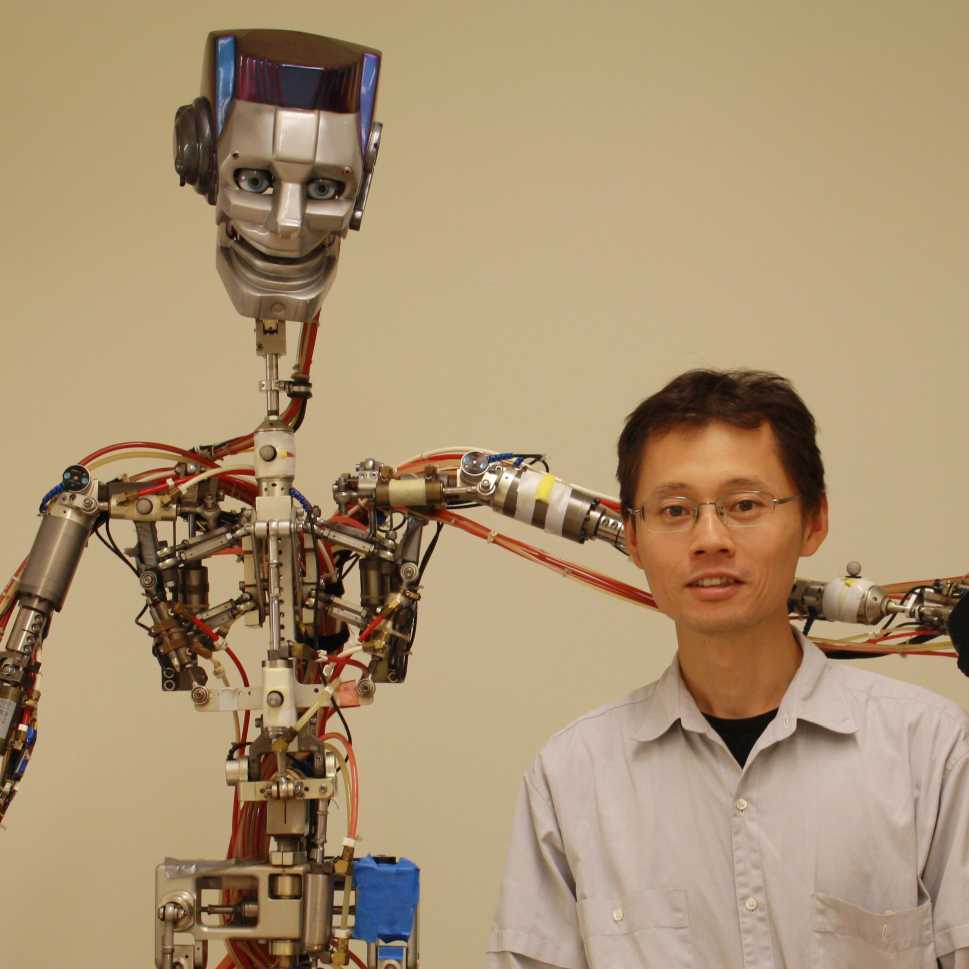ARSO2013 Plenary Talks
Thursday, November 7, 2013, 10:45-11:45, Room 402

Robotics: From Entertainment to Society
Dr. Katsu Yamane
Senior Research Scientist, Disney Research, Pittsburgh, PA, U.S.A.
Abstract: Many roboticists envision a future where robots are commonly seen in daily environments as co-workers or companions of humans. Unfortunately, we are still quite far from that goal due to a number of issues: mechanical design, actuators, sensors, control, environmental uncertainties, external disturbances, and human personalities. In order to perform any realistic user tests, the robot has to be able to cope with all of these issues to the extent that the system does not cause catastrophic failure, although even handling each of them individually is not trivial.
In this talk, we argue that entertainment applications, while not usually considered practical, can actually be effective for boosting the progress towards this goal. The biggest advantage of using entertainment applications is that we can adopt a step-by-step approach where the robot developers control the environment and context so that they can focus on one problem at a time, rather than trying to solve all the difficulties mentioned above. Such applications also have lower bars for the completeness of the system because the interactions tend to be short and the outcomes are less critical than in real environments.
For example, it would be very difficult to develop an interactive robot that can interact naturally with humans in every situation the robot may encounter in general homes. For entertainment purpose, on the other hand, the developer can define the context in which the interaction occurs and therefore significantly limit the variety of possible interactions, thereby simplifying the implementation. Even wizard-of-Oz style may be appropriate if the purpose is to simply collect data from real users.
This talk will highlight several projects conducted within Disney Research that tackle different problems towards human-friendly, autonomous, and interactive robots. I will also speculate on how these projects can be extended to more "plactical" applications by combining the strength of each project.
Brief Biography: Dr. Katsu Yamane received his B.S., M.S., and Ph.D. degrees in Mechanical Engineering in 1997, 1999, and 2002 respectively from the University of Tokyo, Japan. He is currently a Senior Research Scientist at Disney Research, Pittsburgh and an Adjunct Associate Professor at the Robotics Institute, Carnegie Mellon University. Prior to joining Disney, he was an Associate Professor at the University of Tokyo. Dr. Yamane is a recipient of numerous awards including King-Sun Fu Best Transactions Paper Award and Early Academic Career Award from IEEE Robotics and Automation Society, and Young Scientist Award from Ministry of Education, Japan. He has served as an Associate Editor of IEEE Transactions on Robotics and an Area Chair or Robotics: Science and Systems Conference, as well as a program committee member of various international conferences in robotics and graphics. His research interests include humanoid robot control and motion synthesis, human-robot interaction, character animation, and human motion simulation.
Friday, November 8, 2013, 9:45-10:45, Room 402

From Challenges to Innovation in Robot-Based Automation
Dr. Rainer Bischoff
Head of Technology Development, KUKA Laboratories GmbH, Augsburg, Germany
Abstract: Robotics is a key driver of competitiveness in manufacturing. The spread of robotics technologies into other industries will increase this competitiveness effect dramatically. Further to these competitiveness advantages, robotics has a pivotal role to play in addressing some of the key societal challenges facing Europe and the rest of the world in areas as diverse as demographic change, health and well-being, food production, transport and security. KUKA is closely tracking these global challenges and mega trends to gain a strategic vision, to capitalize on emerging opportunities and to understand needs of future customers.
Several studies have been undertaken to derive roadmaps for robotics and robot-based automation from societal challenges and mega trends, with KUKA in leading roles driving the related community efforts. In Europe, the two key studies and roadmaps are the Strategic Research Agenda for robotics in Europe, which is currently being updated by the European robotics community, and the Multi-Annual Roadmap for Factories of the Future, developed by key stakeholders in manufacturing. By developing solutions for the technical challenges addressed in these roadmaps, the role of robots in and their impact on society will only grow.
Because of its customer focus and innovation strength KUKA has become the technology leader in robotics and robot-based automation in its core activity automotive, but also in existing and emerging general industry markets such as solar and aircraft, as well as the medical systems, logistics, metals and plastics sectors. Recent KUKA developments and innovations will be exemplified that are fundamental to meeting the societal challenges sustainably, humanely and cost-effectively.
Brief Biography: Dr. Rainer Bischoff is Head of KUKA's Technology Development department based in Augsburg, Germany. In this position he is responsible for KUKA's research and technology development projects with partners world-wide and the pre-development of technologies to be handed over to product development. Dr. Bischoff received his "Doktor-Ingenieur" degree from Karlsruhe Institute of Technology in 2010 and his "Diplom-Ingenieur" degree in electrical engineering from Hannover University, Germany, in 1995. He has been active in industrial and service robotics, measurement science and control engineering since 1993 with a particular focus on system architecture and integration, sensor-based robot control, and multi-modal human-robot interaction.
Dr. Bischoff has worked at the Bundeswehr University Munich, at the LEEI in France, at EMCO Corporation, Texas, and at the City University of Hong Kong. Since 2002 Dr. Bischoff has been working for KUKA coordinating and managing the company's cooperative research projects on a European and national level. Since 2008 he is the Executive Board Chair of the European Robotics Technology Platform EUROP. In this capacity he has been setting the Strategic Research Agenda for European robotics until 2020, successfully establishing closer links between robotics academia and industry, and promoting European robotics as a whole. Since 2012 Dr. Bischoff is Vice-President Industry of euRobotics AISBL - the European Robotics Association, through which he is driving the process of establishing a public-private partnership in European robotics.
Dr. Bischoff has authored over 100 papers, receiving three best paper awards. In 2006, Dr. Bischoff received the IEEE/IFR Invention and Entrepreneurship Award for a flexible and scalable collision avoidance system for industrial robots, and in 2012, he was granted the IEEE Robotics and Automation Society Early Career Award for leadership and outstanding contributions to the cooperation of academia and industry, and for managing and promoting significant technology transfer in the area of industrial and service robotics.